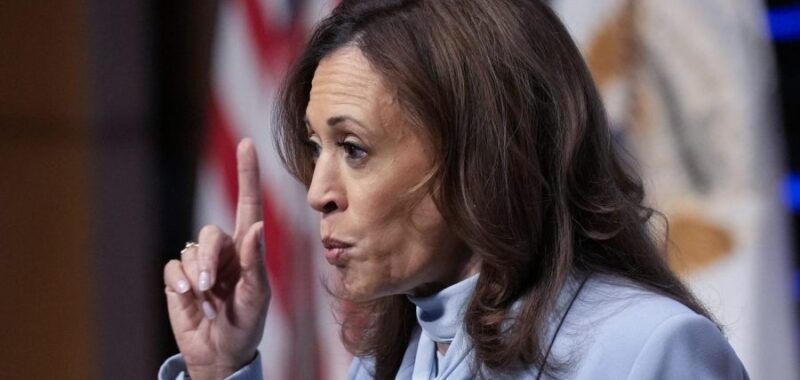
Vice President Harris has yet to propose solutions to address poverty in America. If we fill in the blanks based on her past policy support and legislative proposals, we find a champion for ideas that keep people locked in poverty, rather than set the unfortunate on a path of upward mobility.
Hard-left policymakers like Harris posit that universal basic income (UBI), which gives people a standard welfare payment with no work requirements, is the solution to economic insecurity. Instead of growing earnings potential or human capital, UBI advocates want to grow the poor’s dependence on government.
However, they never seem to consider how people change their behavior when they receive no-strings-attached cash. Recent research published by the National Bureau of Economic Research, studying the impact of $1,000 monthly UBI payments on low-income households, found predictably negative outcomes: Fewer recipients worked, hours worked each week fell, and overall income (excluding the cash transfers) fell.
The intuitive folly of UBI is probably why public support for it — even among lower-income individuals — is lower and has declined recently. In 2020, the Pew Research Center found that less than half of Americans supported the idea, even amid double-digit unemployment during the pandemic. As of October 2023, polling from the State Policy Network shows support is down to 35 percent.
Would Vice President Kamala Harris, as president, seek to implement a demonstrably unpopular and economically destabilizing UBI program nationwide? Her record suggests she would. It just may not be called UBI.
As vice president, Harris cast the tie-breaking vote to expand the child tax credit through the inflationary American Rescue Plan. Democrats and the Biden-Harris administration hiked the tax credit to $3,600 per young child and $3,000 per school-aged child from $2,000. By making the credit fully refundable and doling it through monthly checks to households, regardless of tax liability or work — a departure from how the credit worked previously — they test-drove a back-door UBI.
If made permanent, the warped Biden-Harris tax credit would create massive disincentives to work, according to scholars at the University of Chicago: they estimate that 1.5 million working parents would drop out of the workforce. Expect Harris to push for a backdoor UBI through an expanded child tax credit, since it was included in the Biden-Harris 2025 budget.
That wasn’t her only UBI attempt. As a senator, Harris sponsored a bill spending upwards of $16 trillion to give each adult and dependent (up to three) in most U.S. households $2,000 per month for the duration of the pandemic. With no work requirements or other restrictions, this benefit would have been in addition to — not instead of — other public benefits. Poor and middle-class households would have suddenly had thousands of dollars more to spend on top of stimulus checks, unemployment benefits, and deferred rent and student loan payments.
These Harris bucks would have fueled consumer spending when supply was restricted, triggering inflation even worse than what we experienced and still grapple with today.
Additionally, in 2019, then-presidential candidate Harris aimed to lift poor and middle-class households with her $3 trillion LIFT Act. This signature bill proposed creating a refundable tax credit of $3,000 for single working adults or $6,000 for couples earning less than $100,000 per year to be added on top of the Child and Earned Income Tax Credits.
Believing that the way to address poverty is for government to flood household bank accounts until they reach some arbitrary level of financial security is naive at best. At its worst, it could be devastating. This paternalistic approach erases individual effort and choices.
Furthermore, the government’s financial support could never end. (And, by the way, how would it be funded?) Individuals would not be motivated to seek careers and employment to better themselves. UBI is a band-aid; it does not get to the root cause.
Data tell us that there is one surefire way to prevent people from falling into generational hardship and guarantee them a spot in the middle class: the three-part success sequence.
Ninety-eight percent of people who obtain a high school diploma, work full-time, and marry before having children stay out of poverty. In contrast, three-quarters of those who don’t do those three things are in poverty at any given moment. And this is true of all races, ethnicities, and ages.
It is doubtful that Harris’s fealty to the politics of the far-left would ever allow her to advocate for education, work, marriage and parenthood, in that order. Old-school norms such as personal agency, delayed gratification and personal responsibility are absurdly considered racist today by those pushing modern victimhood politics.
America needs solutions that work, not just those that are easy. We can champion the success sequence without blaming those stuck in a poverty trap and shape policies to support its adoption. To hide the truth and blame society robs poor individuals of the chance to create a better life for themselves and their children.
If Harris cares so much about children, as we heard during the Democratic convention, I challenge her to promote the success sequence rather than send another government check.
Patrice Onwuka is the director of the Center for Economic Opportunity at Independent Women’s Forum and co-host of WMAL’s O’Connor & Company.

